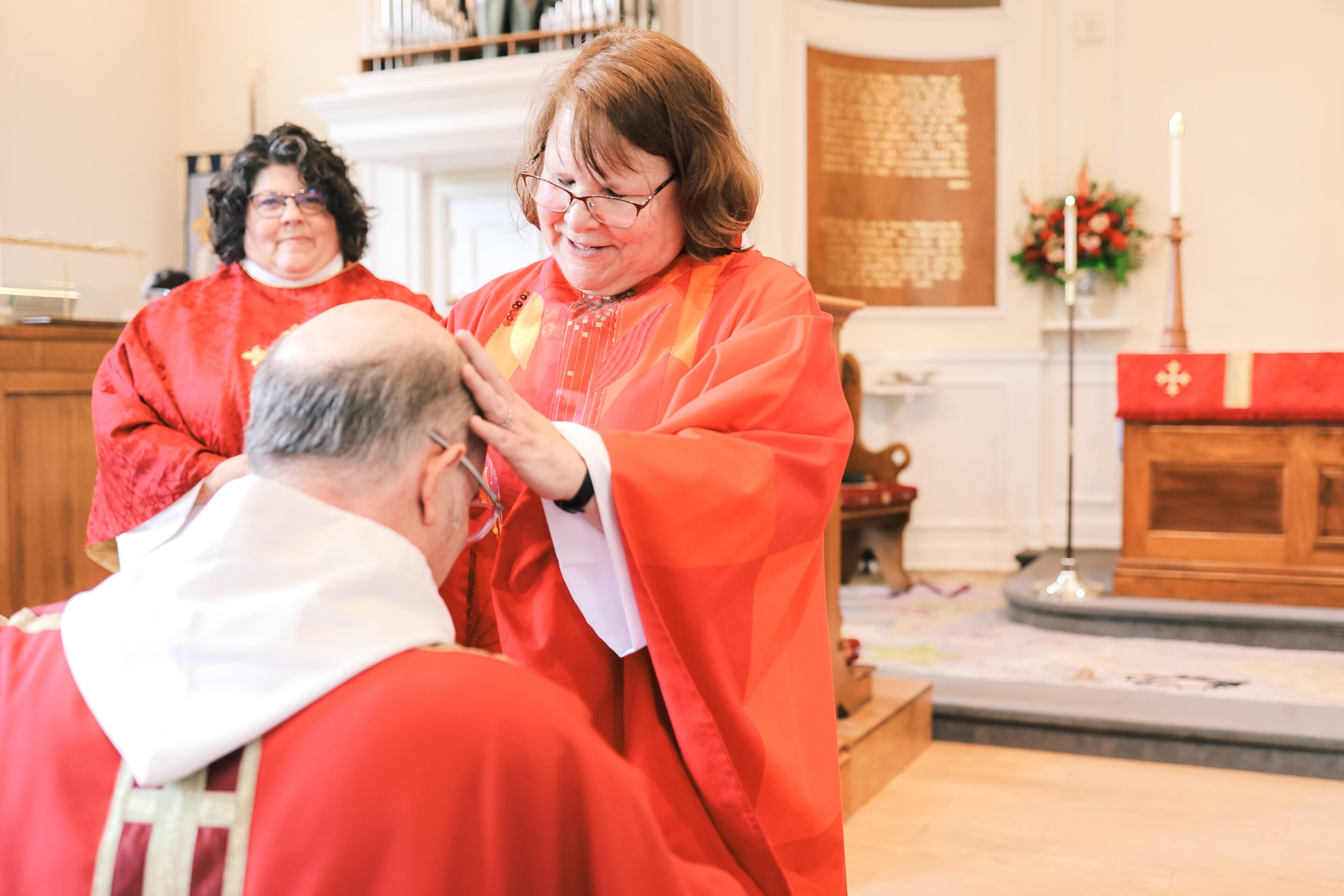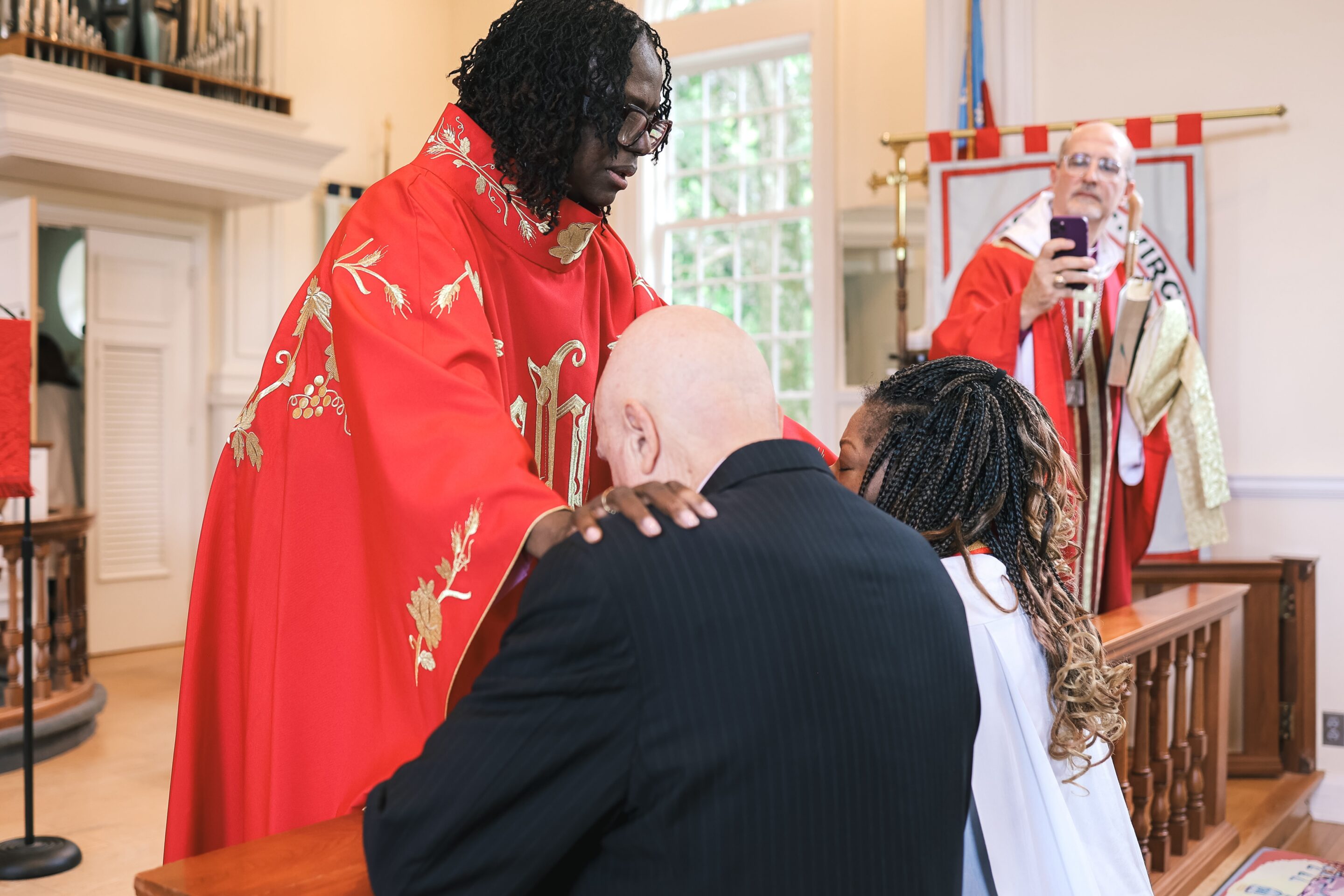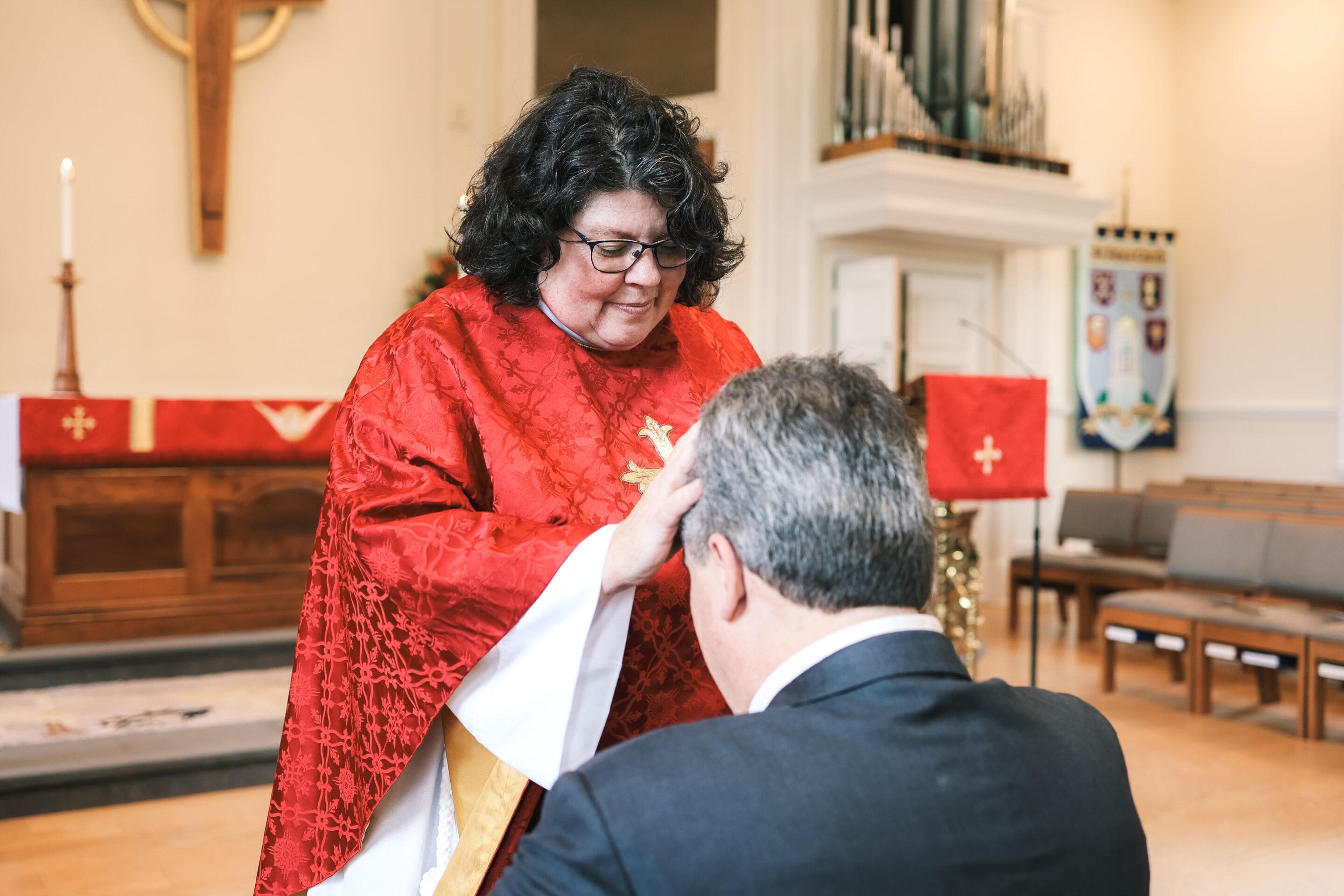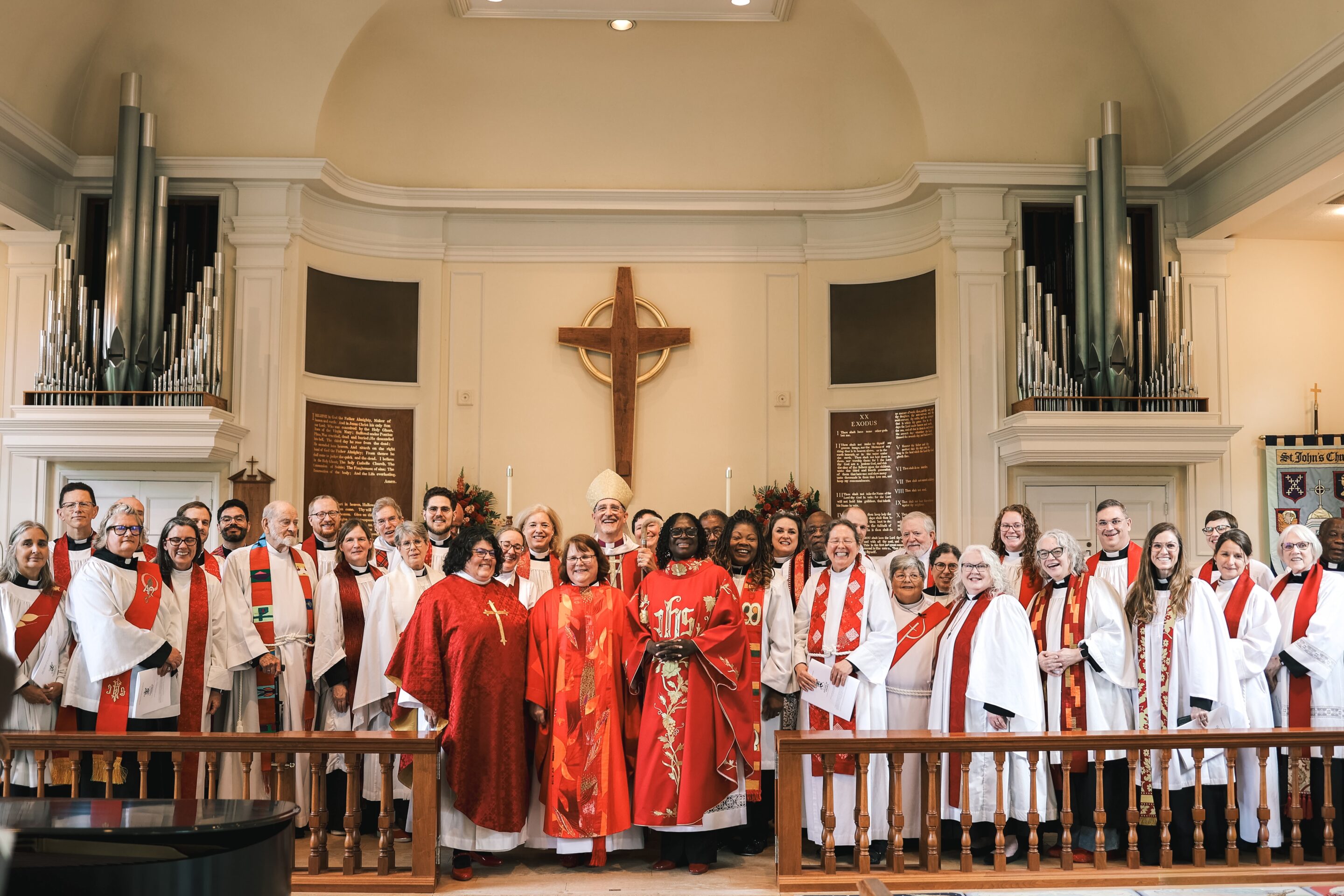
Three new priests — Kara Laughlin, Kris Rose, and Joy Warburton— became ordained Sept. 20 at St. John’s Episcopal Church in McLean. Three times during the service, The Rt. Rev. Mark A. Bourlakas, Assistant Bishop of Virginia, intoned, “Fill her with grace and power and make her a priest in your church.”
In her sermon, The Rev. Kelly Moughty, rector of Episcopal Church of the Holy Cross in Dunn Loring, recalled witnessing “challenges that each of you have faced on your journey to get to this point, and that is why I can say with confidence that each of you already know exactly how to be ferociously hopeful. You will need that, my sisters, in the days to come, and your people will need it, too.”
Last year, The Episcopal Church celebrated 50 years of ordaining women to the priesthood.
“It’s a pretty great thing to have been ordained in a group of three women who were all born into a world where women weren’t really allowed to imagine themselves at the altar, unless it was before and after the service, tending to the altar linens and floral arrangements,” Kara Laughlin said. (Her childhood parish priest, The Rev. Gordon J. Stenning, was one of the six signers of the original resolution to allow women to be ordained priests in The Episcopal Church.)
I am grateful to all the women who paved the way to make the path for me less challenging,” Kris Rose said.
The new priests were asked to summarize the story of their calling for the Diocese of Virginia readers. They were also asked about balancing clergy work, the significance of ordination, their hope for the future, and any further details they wanted to share. Here are their replies.
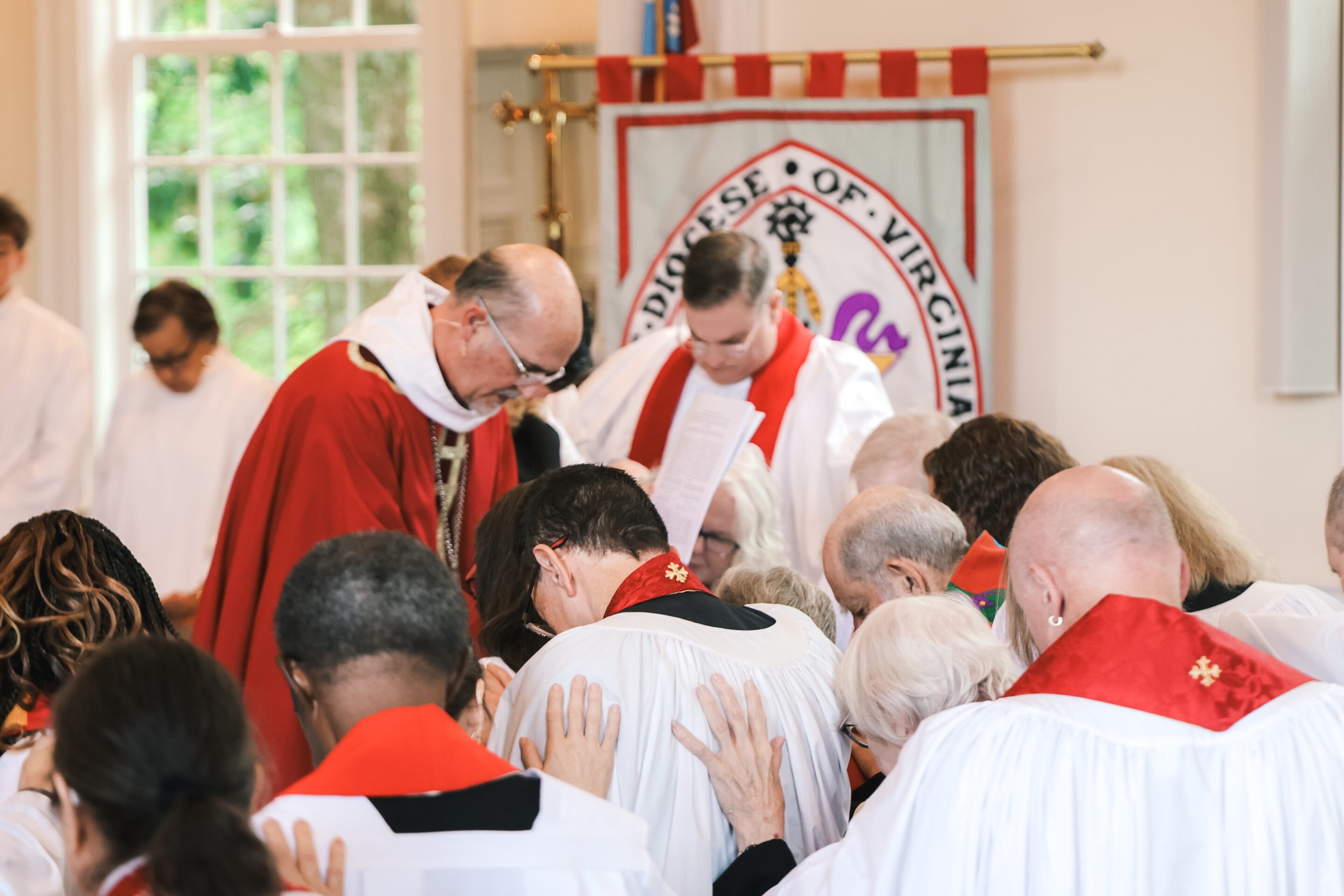
The Rev. Kara Laughlin: “Do the Next Step”
The first time I considered becoming a priest was in 1985 or so. I was in youth group explaining to a boy why what he’d just claimed about Jesus wasn’t quite right, and he said, “Wow, you really care about this stuff. You should become a priest.” I had two simultaneous responses: that would be AMAZING, which I kept to myself and, “No, I don’t think women should be priests,” which I said out loud. We had our first female deacon at the altar, and I didn’t want to cause the kind of consternation and drama that I was seeing play out on Sunday mornings.
Obviously, I’ve since changed my mind about where women belong in the church, and whether the drama is worth it.
For many years after that, I continued to feel a tug toward the priesthood, and I hoped that it would be in my future, but I also had a real feeling of “not yet” from God.
Fast-forward to six years ago: I was a work-at-home mom, co-head of the Teaching Commission at the Episcopal church across the street. It was early morning, and I was listening to a podcast and putting off getting up to get the kids off to school. I was half-awake, not really paying attention, when the interviewee said, “I’ve learned that if you think God might be calling you to do something, and you know what the next step is, you don’t wait to get all your ducks in a row. You do the next step.”
It felt like every cell in my body woke up, and I thought, “I need to go across the street and talk to Mark” (Feather, who was our rector at the time). Then I spent the morning alternately having the thought, “I think God might want me to be a priest,” and then ugly-crying, because I was 50 years old and the idea of hauling my 50-year-old self to seminary and Greek classes while caring for my mom and launching my kids was—let’s just say that I found this idea more than a little irrational at this point.
But I did go across the street, talked to Mark+, and started the discernment process. The six years between then and now were full of drama–some of it much more serious than the Lady-Deacon-at-the-Altar drama—and lots and lots of growth, some of which was uncomfortable. But it’s like any good labor—when it’s over, the pain fades in the beauty and glory of what that labor brought about.
The Sunday after my ordination, I stood up at the altar and celebrated my first Eucharist. It didn’t feel irrational at all, though it did feel pretty miraculous. I guess that makes my ordination to the priesthood a rational miracle?
I thought that I would be a bi-vocational priest, because there is such a need for priests who can take on a part-time call, and I do love to write. But our family circumstances changed, and I’ve taken a full-time position at St. Anne’s in Reston. I’m the Associate Rector for Discipleship, which is pretty great, because discipleship is all about relationship-building, which I love. Maybe someday I’ll be listening to a different podcast and realize that God needs a new ministry started or a church planted, but for now, I’m just very happy to be getting to know and serve the community of St. Anne’s and of Reston. I couldn’t be more pleased to be working full-time in ministry.
Even though my own path to the priesthood felt long and full of twists and turns, I know a little of Joy and Kris’s stories, and I feel like I got off easy. I came first in the alphabet, so I had the luxury of not having my nerves distract me in the moment of Kris’s and Joy’s ordinations. I think I might have gotten more emotional over them–I could not stop smiling, knowing the long roads they took to the priesthood. I’m so honored to have shared the day with them. It’s a pretty great thing to have been ordained in a group of three women who were all born into a world where women weren’t really allowed to imagine themselves at the altar, unless it was before and after the service, tending to the altar linens and floral arrangements.
My mother tells me that my childhood parish priest, The Rev. Gordon J. Stenning, had a feeling about me back when I was eight years old, pinning a towel around my head and pretending to be a nun. He had the wisdom not to tell me about that feeling, but to mentor me well. I wrote to him as I entered seminary, and we were infrequent correspondents until he died in March 2024. It was in reading his obituary that I fully grasped what a supporter of women he was: he was one of the six signers of the original resolution to allow women to be ordained priests in the Episcopal Church. So, his decision to have a woman at his altar in 1985 was a considered one, and he clearly felt the drama I encountered as a teen was in service of God’s greater call.
I reached out to Lauree Hersch Meyer, my former religion professor at Juniata College and a minister in the Church of the Brethren, to ask for a recommendation when I applied to VTS. We renewed an email relationship, and she also supported me from afar until her death in September 2024. Lauree broke the Gospel open in such a powerful way that it just kept unfolding outward through her life and the lives of those she touched.
I have had fabulous mentors and church communities through every step of the discernment process. At St. James, Leesburg, my sponsoring parish, I was fortunate to have three mentor priests along the way: The Rev. Mark Feather, The Rev. Earl Mullins, and The Rev. Dr. Chad Martin.
St. Matthew’s, Sterling (Father Rob Merola, Rector) was my contextual ministry parish, and they really take seriously their commitment “to know and share God’s love.” The entire parish loved me through all my clumsy mistakes, including spilling wine all over the altar during one of my early Sundays as a deacon.
The people of Epiphany Church in Herndon were my first experience with full-time ministry, and The Rev. Dina Widlake taught me a great deal about the rhythms of ministry and the challenges and joys of being a woman leader in the church.
And, of course, the good people of St. Anne’s, including our Rector, The Very Rev. Jessica Holthus, who have thrown themselves into welcome and hospitality wholeheartedly as they enthusiastically do God’s work in the world, and draw me alongside them as they do.
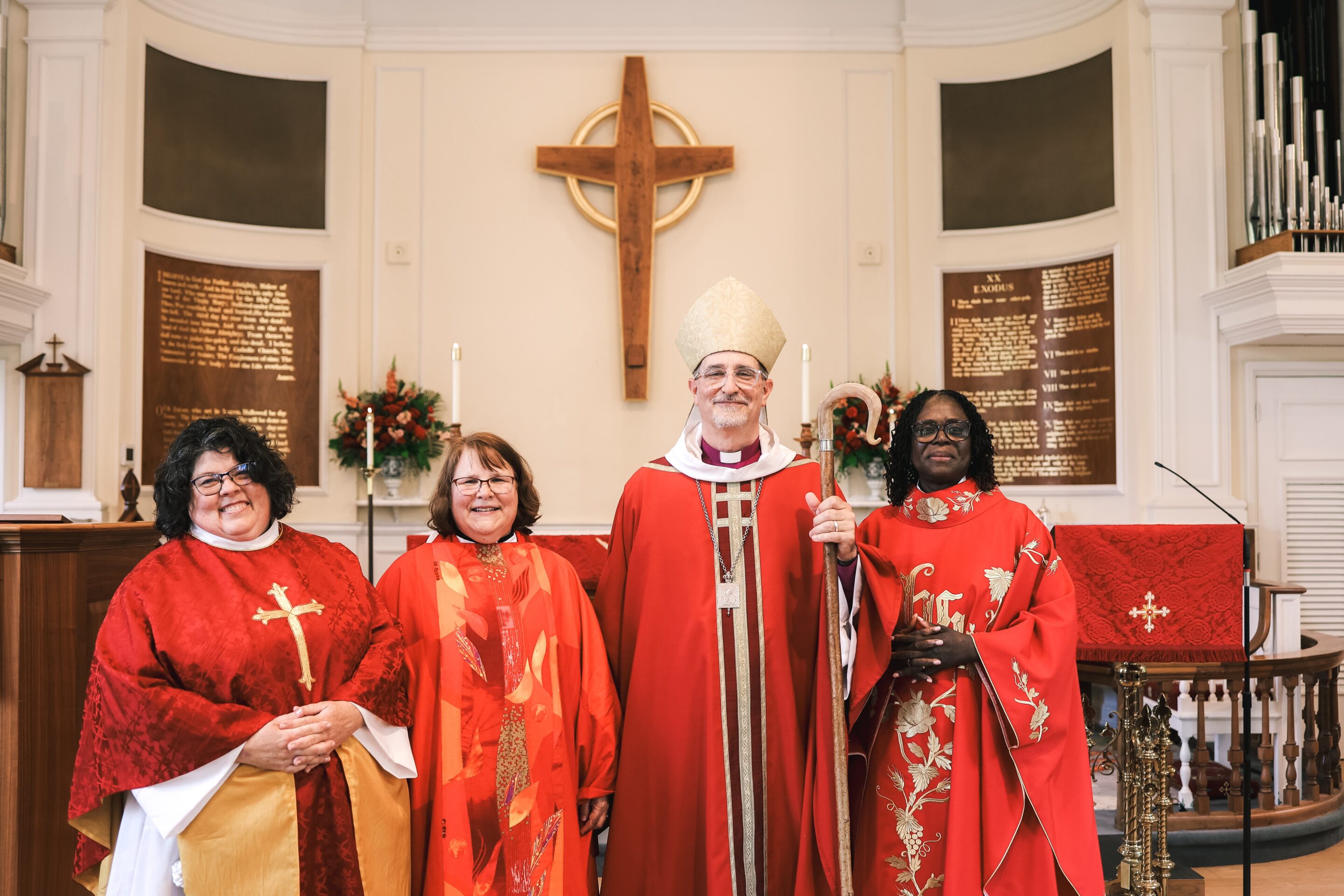
The Rev. Kris Rose: “At Each Turn, God Was There Preparing Me”
From the time I was a child, church was where I was drawn and was given the courage to step out of my comfort zone. In college, I discerned a call to ministry, but after starting work in public schools, I ran from the call, thinking I did not have the skills. I became involved in Education for Ministry, and that silenced the call as I felt I was fully living into my baptismal vows. However, the call to follow Jesus into the world as a priest kept bubbling up and could not be silenced!
In 1989 I visited Virginia Theological Seminary for the first time, and in 2021, I enrolled as a student. My road to the priesthood has been full of twists and turns; I sometimes couldn’t understand why. However, at each turn, God was there preparing me for my future. Sometimes it takes looking back to see God’s hand at work.
I retired from teaching and enrolled in seminary. I worked in public schools as a librarian and teacher. Working in public schools, I could not talk about Jesus. What I could do, however, was model the love that Jesus extends and meet my students where they were. In this space, I learned to show the love of Jesus without the words of Jesus. However, this was not enough, showing love that pointed to me. I needed to speak and invite people into the love of Jesus and the Beloved Community.
Ordination was a space of living into what I was called to do. A space of leaning into God and trusting where I fall short, God will equip. A space of answering, “Here I am, use me, Lord.” It was also a space of recognizing that I did not get to this day alone. It was prayers, words of encouragement from friends, family, and even people whom I have never met, praying for me, that brought me to this day. For this, I am thankful, but each of us never does our work alone. Community and leaning into our triune God bring us to the milestones of saying yes and following Jesus in our ministry.
I am now serving at St. Peter’s Port Royal as Priest-in-Charge. I look forward to continuing to be molded and shaped by God and the people whom I serve. I want to meet people where they are and show and speak the love of Jesus that sustains and carries us through the challenges that we face in life. The love of Jesus calls us to become a Beloved Community, becoming the body of Christ alive in the world today.
I did not arrive at this place on my own; it is only with God’s help and a lot of support. There are too many people to name because each has shaped and molded me into the person I am today. My family has journeyed with me and supported me in this process. My teachers, students, families of students, and colleagues have helped to shape me.
I am grateful to all the women who paved the way to make the path for me less challenging. The Rev. Patsy Geerdes was the first woman to serve as a model. The Rt. Rev. Susan E. Goff, Bishop Suffragan, has been a source of inspiration over the years. I am grateful for The Rev. Allen Breckenridge, who called me into leadership roles in college. There have been many other priests, who have played a part in my formation, too many to name. If you are a priest and know me—know that you have impacted my life.
I give thanks for St. George’s Fredericksburg and The Very Rev. Joe Hensley who raised me up and supported me in my journey. I give thanks for St. Mary’s Arlington and The Rev. Andrew Merrow, where I served for a year in seminary. The Church of the Holy Comforter in Richmond and The Rev. Dr. Hilary Bourbón Smith also played a big part in my formation. I also thank the congregation of St. Christopher’s Springfield and The Rev. Carey Connors who built up my confidence and taught me to let my light shine.
I give thanks to The Rev. Dawn McNamara who has journeyed with me in ministry since college. I give thanks for my parents Anne and Clint Rose who first showed me the unconditional love of Christ and have supported me on my journey. Finally, I thank my son, Charles, who has challenged me and opened my eyes to new ways of seeing things and meeting God in the world.
Rev. Joy Y. Warburton: “The Call Never Left Me”
I was born and raised in Sierra Leone with a deep sense of God’s presence and his invitation. My grandfather was a Methodist minister; my mother was Anglican, and so were my two older siblings and myself. During the weekdays, my mom would wake us up at 5:30 am and we would pray before going to school. I would go to church and pray, helping out wherever needed. I could not fully articulate what was going on, but I knew there was a calling on my life.
My mother was a diplomat. When she was posted to Moscow, Russia, I went with her. While there, I would write sermons and prayers, and in the mornings, I would hold an entire service by myself. I even prepared a mock communion, setting out bread and wine for people I imagined gathered around the table. It became clear to me that I was being called to the priesthood. But at that time, in West Africa, women were not ordained. I had never even seen a female priest, so I tucked that call away and moved on.
Later, when I came to the United States, I worked for an insurance company and married my husband Edmund in 1992. We attended Trinity Episcopal Church in Arlington. It wasn’t until the early 2000s that I saw, for the very first time, an African American woman priest—The Rev. Kim Coleman. Thanks be to God, she helped me put words to what I had been feeling all those years. She encouraged me to attend a diocesan discernment retreat in 2008. That is when I began to see more clearly the path God had set before me.
Serving as a Lay Eucharistic Minister (LEM) gave me a foretaste of the ministry I longed for. What I had practiced in Moscow—sharing the bread and wine—I was now doing for real. One morning, while driving to work through the Mixing Bowl in Springfield where three interstates converge, I heard a voice say, “Joy, feed my people.” Even now, I get goosebumps recalling that moment. It was God’s affirmation of my call. Yet I also know this: if I had never seen Rev. Kim—a woman, and an African American priest—I might never have believed it was possible. Representation matters.
In 2008, Bishop Peter Lee approved me to attend seminary. But with two young children at home, Cameron and Elaine (now 28 and 31), and the financial realities of needing two incomes in the face of daunting seminary costs, I stepped back from the ordination process. Still, the call never left me. Each time I stood behind the altar as a LEM, I felt at home. And whenever Rev. Kim needed coverage for morning prayer, I was ready to lead.
During the COVID lockdown, I was working as parish administrator over at St. Thomas’ McLean, who asked us to write reflections. I wrote some, and the response from parishioners—Maggie Beatty was one in particular—was that “there’s something going on with Joy.” So, Fran called me to her office in 2022 and said, “Have you ever considered that God might be calling you to be a priest?” I smiled, and I explained to her that I was not a postulant, I was still a seeker. She explained what Maggie Beatty had said to her about sensing a call in me. And she encouraged me to pursue the process.
Later, in a Zoom meeting with the Committee on Priesthood, one of the members said to Rev. Fran, “If Joy goes to seminary, you will lose your parish administrator.” She replied, “I’m not going to get in the way of the Holy Spirit!” Rev. Fran and Rev. Kim worked together on my process, and in fall 2022 I quit St. Thomas and went to Virginia Theological Seminary full time as a commuter student.
My ordinations are very special to me. I was ordained a deacon on March 1, just weeks before my birthday on March 23. My priestly ordination fell on my son Cameron’s 28th birthday. Having him witness that sacred occasion made it all the more momentous. I do not say that I “waited” to become a priest, because it was not that I was ever stopped or held back. Rather, I made a conscious choice to do what was best for my family at the time.
Still, after so many years, being ordained a priest is a profound milestone. To be entrusted with this call—a call that first took root in Sierra Leone, almost 4,400 miles away—fills me with deep humility and gratitude. It was, and always will be, a sacred day I will never forget.
I now feel incredibly blessed to serve at St. Francis in Great Falls as the Associate Rector for Family Ministry, since August 1. Under the mentorship of the Rev. E. Weston Matthews, Priest-in-Charge, my focus is to immerse myself in the sacramental life of the parish—helping people encounter God’s love in tangible ways through worship, teaching, and pastoral care. Nurturing children in faith during this particular time and place is a vital part of that ministry.
I am overflowing with gratitude for the people whose steadfast support paved the way for God’s call on my life to be manifested, people like Darlene Sellars, Maggie Beatty, my family, and the individuals I have already mentioned. My prayer as I move forward is to remain humble in this call, to walk faithfully with the people of God, and to encourage hope—just as Kelly Moughty, another one of my mentors, preached at my priestly ordination. Hope has been the thread running through my own journey.
I never abandoned my calling, even when my hope dimmed. It remained underneath, steady and sure. Now, my greatest desire is to share that hope, to preach the gospel, and to remind people how deeply Jesus loves us.
